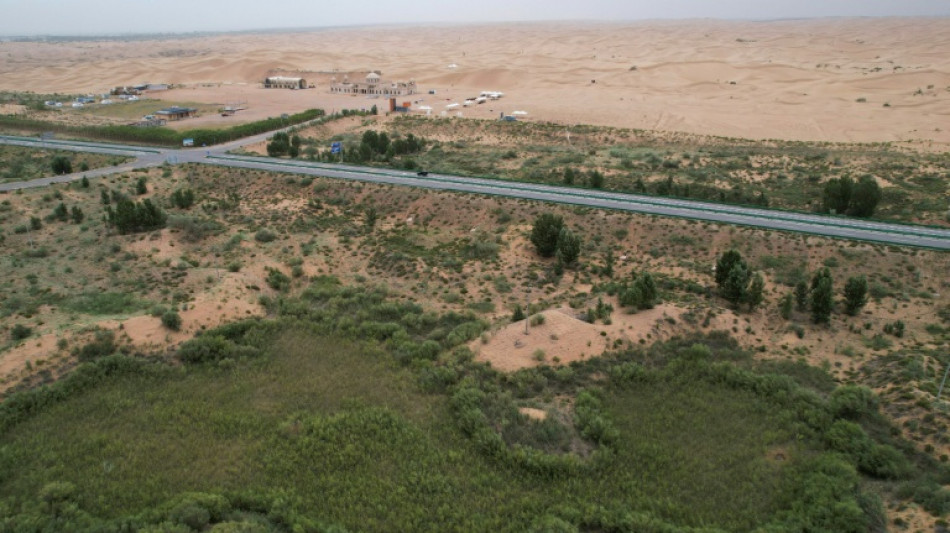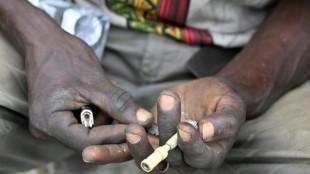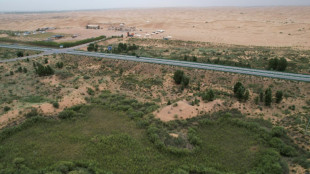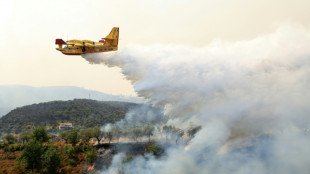
-
 Siraj on song as West Indies stumble to 90-5 in first India Test
Siraj on song as West Indies stumble to 90-5 in first India Test
-
No more signs of life in Indonesia school collapse: rescuers

-
 'Defect or be jailed': Turkey opposition mayors face new threat
'Defect or be jailed': Turkey opposition mayors face new threat
-
Addicts swap drug dens for support centre in Abidjan

-
 Afropop icon Adekunle Gold embraces Nigerian roots with new album
Afropop icon Adekunle Gold embraces Nigerian roots with new album
-
Lithuania builds shelters as drones prowl border skies

-
 Wallabies bench O'Connor for All Blacks Test as Slipper set for farewell
Wallabies bench O'Connor for All Blacks Test as Slipper set for farewell
-
Philippine quake toll rises to 72 as search winds down

-
 Zelensky at European summit as EU seeks to bolster backing
Zelensky at European summit as EU seeks to bolster backing
-
Papua New Guinea approves contentious defence treaty with Australia: PM

-
 Over a dozen Australian suncreams pulled over safety concerns
Over a dozen Australian suncreams pulled over safety concerns
-
Dodgers down Reds to advance in MLB playoffs, Yankees stay alive

-
 Skipper Scott Barrett returns as All Blacks change six for Wallabies Test
Skipper Scott Barrett returns as All Blacks change six for Wallabies Test
-
China's 'Great Green Wall' brings hope but also hardship

-
 Let the 'Showgirl' era begin: Taylor Swift's new album is almost here
Let the 'Showgirl' era begin: Taylor Swift's new album is almost here
-
Philippine quake death toll rises to 72

-
 Elon Musk halfway to becoming world's first trillionaire: report
Elon Musk halfway to becoming world's first trillionaire: report
-
Surridge penalty lifts Nashville over Austin for US Open Cup

-
 Trump jeopardising US role as scientific leader: Nobel officials
Trump jeopardising US role as scientific leader: Nobel officials
-
Gaza aid flotilla presses on despite Israeli interception

-
 Asian markets surge on US rate hopes, tech fired by chip deal
Asian markets surge on US rate hopes, tech fired by chip deal
-
Trump wants Nobel but 'forgotten' peacemakers more likely, experts say

-
 Deepfake political scam ads surge on Meta platforms, watchdog says
Deepfake political scam ads surge on Meta platforms, watchdog says
-
Yankees, Guardians and Padres stay alive in baseball playoffs

-
 Papua New Guinea approves contentious defence treaty with Australia: officials
Papua New Guinea approves contentious defence treaty with Australia: officials
-
Rescuers search for 59 people trapped under collapsed Indonesian school

-
 Two killed as violence flares in Morocco protests
Two killed as violence flares in Morocco protests
-
Rising wildfires spur comeback for Canadian water bomber

-
 G7 ministers to target those increasing Russia oil purchases
G7 ministers to target those increasing Russia oil purchases
-
Australia 'mushroom murderer' Erin Patterson to appeal conviction

-
 Guardians, Padres stay alive in first round of baseball playoffs
Guardians, Padres stay alive in first round of baseball playoffs
-
Barca must defend better to reach PSG level: Flick

-
 Fitzpatrick blasts 'offensive' PGA chief after Ryder Cup row
Fitzpatrick blasts 'offensive' PGA chief after Ryder Cup row
-
'Dangerous' Odegaard has freedom to shine for Arsenal, says Arteta

-
 PSG stun Barcelona in Champions League, Man City held by Monaco
PSG stun Barcelona in Champions League, Man City held by Monaco
-
Israeli warships intercept Gaza aid flotilla with Greta onboard

-
 Air traffic controllers warn of US shutdown strain
Air traffic controllers warn of US shutdown strain
-
'Conservation giant': World reacts to Jane Goodall's death

-
 Haaland scores twice but Man City denied by Monaco in Champions League
Haaland scores twice but Man City denied by Monaco in Champions League
-
Guirassy helps Dortmund sink Bilbao in Champions League

-
 Trump offers security guarantees to Qatar after Israel strikes
Trump offers security guarantees to Qatar after Israel strikes
-
Dow, S&P 500 end at records despite US government shutdown

-
 Ramos snatches Champions League holders PSG late win at Barca
Ramos snatches Champions League holders PSG late win at Barca
-
Martinelli extends Arsenal's perfect start in Champions League

-
 Hojlund and De Bruyne combine to push Napoli past Sporting
Hojlund and De Bruyne combine to push Napoli past Sporting
-
Russia cut power to defunct Chernobyl nuclear plant, Ukraine says

-
 World-renowned chimpanzee expert Jane Goodall dies at 91
World-renowned chimpanzee expert Jane Goodall dies at 91
-
First woman coach breaks barriers in Brazil basketball

-
 Gaza aid flotilla says Israeli warships 'intercepted' boats
Gaza aid flotilla says Israeli warships 'intercepted' boats
-
Vinicius, Rodrygo back in Ancelotti's Brazil squad


China's 'Great Green Wall' brings hope but also hardship
Inner Mongolian herder Dorj looked bitterly at the vast grasslands where his flock once grazed freely, before the practice was banned as part of a massive Chinese state greening project.
Restrictions on traditional grazing are a key part of China's "Great Green Wall" campaign, a decades-old anti-desertification project credited with "greening" over 90 million hectares.
The campaign initially aimed to contain the expansion of deserts in the arid north caused by intensive farming, grazing, mining and climate change.
But in some places the goal has now evolved into creating new arable land, and the project combines large-scale tree planting with sowing drought-resistant creepers, and even installing vast solar arrays to limit wind and shade plants.
China has lately touted the project at international meetings, and President Xi Jinping last week pledged to increase forest cover to help meet climate goals.
Planting the equivalent of 840,000 football pitches around Inner Mongolia's Kubuqi desert has created tens of thousands of jobs and helped alleviate poverty, a 2015 United Nations study found.
But for some ethnic Mongolians, who make up 17 percent of the autonomous region's population, the campaign has eroded traditional farming practices and culture.
Dorj's herd -- now reduced to around 20 sheep -- is confined to a fenced area around his brick home that he says is too small and sparse.
In the Kubuqi desert, herders have paid the price for fixing habitat degradation they did not cause, said Enghebatu Togochog, a Mongolian activist living in exile in the United States.
The measures "have forcibly displaced herders, severing their connection to the land and disrupting sustainable practices that maintained the grasslands' delicate balance for millennia".
Traditional nomadism in Inner Mongolia effectively vanished ten years ago, he added.
When AFP visited, reporters were followed by men who said they worked for local authorities throughout their trip, impacting their ability to speak to other herders.
- Overestimated impact? -
In a 2017 article, Chinese researchers acknowledged that the effect of grazing on desertification in China might have been overestimated.
They pointed to other factors, including still-prevalent mining, intensive agriculture, and climate change.
The ban on free grazing, and the introduction of dedicated patrols to enforce it, has triggered regular protests by herders and several arrests, according to academics and NGOs.
Togochog says the greening project is "part of the overall project of just completely changing the Mongolian landscape" and traditional way of life.
"The sole beneficiaries are the Chinese -- especially the state, the companies," he said.
Neither Elion Resources Group -- the Chinese company in charge of the Kubuqi project -- nor the local municipality replied to AFP's request for comment.
Experts say greening projects should avoid non-native and water-intensive plants.
"A plant that consumes too much water can deplete the water table and lead to further degradation," said scientist Zhang Yanping as she took samples from pines and poplars planted a decade earlier in the Kubuqi.
And the instinct to convert desert into greenery is not always the right one, said Wang Shuai, a geography professor at Beijing Normal University.
"Deserts have important ecological functions, like water conservation and biodiversity," he said.
"It's not necessary to eliminate them... (just) to prevent their expansion."
- 'Everything was desert' -
Around the newly greened areas, large billboards display a slogan by President Xi extolling the Great Green Wall's philosophy: "Clear waters and green mountains are as valuable as gold and silver mountains."
Between 2016 and 2050, the state aims to plant another 70 million hectares, an area the size of continental France, according to official documents.
China's largest desert, the Taklamakan, is now completely surrounded by vegetation, according to the forestry administration.
The project is credited with helping boost the average income of local farmers and herders, including Mongols, the UN report found.
Several kilometres west of Dorj's house, farmer Bai Lei gently eased from the sand a Cistanche -- a parasitic plant prized in traditional Chinese medicine.
"Before, everything here was desert," she said, proudly gesturing at fields full of corn and sunflowers.
Bai, from China's Han majority, started her business over ten years ago.
Cistanche is particularly well suited to fighting desertification, she said -- it grows on the roots of other plants, anchoring its host.
Around Bai's farm in Dengkou county, more than 90 businesses grow the fleshy, yellow-flowered herb, according to state media.
Tourism is also now thriving in the desert.
Feng, a Han former farmer who only gave his surname, now runs a busy quadbike rental business in an area undergoing greening.
He said the grazing ban helped increase available pastures, and that grazing was allowed in areas once plants matured enough to produce seeds.
"Resources are more abundant, and our lives are more prosperous," he told AFP.
"We can hold our heads up with pride."
Q.Najjar--SF-PST
